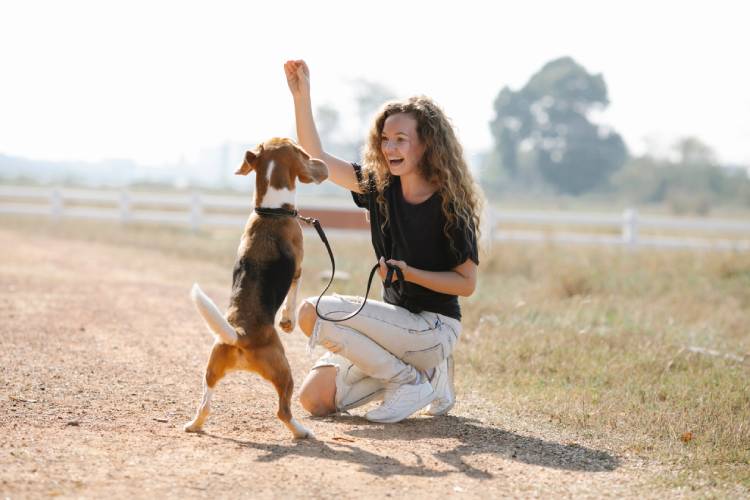Training an older dog can be challenging, but it is possible. It is never too late to teach an old
dog new tricks. With patience, consistency, and positive reinforcement, you can help your senior canine companion learn new skills and behaviors. In this article, we will provide you with seven must-follow tips for training an older dog as well as one important aspect that’s often overlooked.
7 Best Tips for Training Your Older Pup
Here are the seven best tips on how to train your older dog.
Start with Basic Commands
Training an older dog should begin with basic commands such as sit, stay, come, and heel.
These commands are essential for establishing a foundation of good behavior. Your dog may
have learned some of these commands in the past, but they may need to be refreshed or
relearned. It is important to practice these commands regularly and to be patient with your dog as they adjust to the training process.
READ NEXT: Pomeranian Pitbull Mix – A Unique and Beautiful Hybrid
Use Positive Reinforcement
Older dogs respond well to positive reinforcement. Rewards such as treats, praise, and affection can help to reinforce good behavior. It is important to reward your dog immediately after they perform the desired behavior. This will help to reinforce the behavior and make it more likely that your dog will repeat it in the future.
Keep Training Sessions Short
Older dogs may have limited stamina and attention spans, so it is important to keep training
sessions short. Aim for training sessions that are no longer than 10-15 minutes. This will help to keep your dog engaged and focused during the training session.
Must Read: Goldendoodle Husky Mix – A Complete Breed Profile
Be Patient
Training an older dog may take longer than training a younger dog. Older dogs may have
developed habits and behaviors that are harder to break. It is important to be patient and to avoid getting frustrated with your dog. Consistency and persistence are key when training an
older dog.
READ Also: Can Cats Drink Oat Milk – The Ultimate Guide
Adjust to Your Dog’s Needs
Older dogs may have physical limitations or health issues that need to be taken into
consideration during training. For example, if your dog has arthritis, you may need to adjust the training exercises to accommodate their condition. It is important to work with your veterinarian to ensure that your dog is healthy enough for training and to make any necessary adjustments to the training plan.
CHECK OUT: Best Dog Gadgets – Every Pet Owner Must Have
Socialization
Socialization is an important part of training for dogs of all ages. Socialization can help to reduce anxiety and stress in your dog and can help them to develop better behavior around other dogs and people. Older dogs may have had limited socialization experiences, so it is important to start slowly and expose your dog to new experiences in a positive and controlled manner.
Stay Consistent
Consistency is key when training an older dog. It is important to establish clear rules and
boundaries and to consistently reinforce them. Inconsistency can lead to confusion and
frustration for your dog, which can make training more difficult.
The Importance of Nutrition and Health for Training
Nutrition and supplementation are important factors to consider when it comes to training dogs. A well-balanced diet and proper supplementation can provide your dog with the energy, nutrients, and support they need to perform well during training sessions.
Dogs require a diet that is rich in protein, vitamins, and minerals to maintain their health and
support their physical activity levels.
You may be interested in: Beagle Pitbull Mix Puppy
High-quality dog food should provide your dog with all the necessary nutrients they need, but it’s important to ensure that your dog is receiving the appropriate amount of food based on their age, weight, and activity level. In addition to a well-balanced diet, supplements can also be beneficial for dogs undergoing training. Joint supplements.
For Example: Can be helpful for older dogs or dogs that are more prone to joint issues. These supplements can help to support joint health and reduce the risk of injuries during training sessions. Another example is omega-3 fatty acid supplements, which can help support cognitive function and aid in learning and memory retention during training. These supplements can be especially helpful for dogs that are learning new behaviors and commands.
Conclusion
Starting with basic commands, using positive reinforcement, keeping training sessions short,
being patient, adjusting to your dog’s needs, socializing your dog, and staying consistent are all important tips to follow when training an older dog. Remember to be patient and to enjoy the process and DON’T be discouraged if things move along a little slower than you’d like. By
working together, you can help your dog live their best life.
